More than 35 years after their passage, New York's Rockefeller drug laws appear to be on their last legs. But it's not a done deal yet, and the battle over what the final reform package will look like continues in Albany.
Those field drug test kits police use to test for the presence of illegal drugs are so unreliable they should be banned, researchers said Tuesday. A Hershey's candy bar, Dr. Bronner's Magic Soap, and Tylenol are just a few of the common items that generate false positives. Air was another.
It's jail and prison guards gone wild this week, and a veteran California cop whose pill problem got the best of him.
Observers of the drug war have long known about its racial disparities, but a new report from Human Rights Watch makes them glaringly obvious.
The Pew Center on the States has released a report noting that 1 in 31 Americans is either in jail or prison or on probation or parole. Although two-thirds of them are probationers or parolees, it is prisons that are gobbling up the corrections budget. That needs to change, the report said.
South Dakota has become the 14th state to ban salvia divinorum, based on little more than YouTube videos and the fear that somebody somewhere might be getting high for a few minutes.
When investigating a DC area cocaine dealer, police installed a GPS tracking device on his vehicle without bothering to obtain a search warrant. Now two leading civil liberties groups are urging a DC appeals court to rule such actions a violation of Fourth Amendment protections against unreasonable searches and seizures.
The effort to legalize medical marijuana in Minnesota is taking up where it left off last year. A bill has now passed two Senate committees, and action in the House is expected shortly. But the Republican governor is still threatening to veto it.
An Illinois House committee has narrowly approved a medical marijuana bill. Now it's on to the next votes.
Some 7,500 Mexican soldiers are flooding into Ciudad Juárez in a bid to blunt prohibition-related violence that has left about 2,000 people dead there since January 2008. Meanwhile, the head of the US Joint Chiefs of Staff is headed to Mexico for talks on increased cooperation between the two neighbors.
The influx to Dutch border towns with cannabis coffee shops of tens of thousands of Europeans each week from countries with more repressive cannabis policies has led to myriad problems in those border towns. Now, mayors of two of them say they will simply shut them down.
Events and quotes of note from this week's drug policy events of years past.
If Obama Supports Medical Marijuana, What About Hemp?," "Field Tests for Identifying Drugs Are Proven Wildly Inaccurate," "SWAT Raids on Innocent People are Bad," "How Come the Dutch Smoke Less Marijuana Than Americans?," "California DMV Agrees to Let Medical Marijuana Patients Drive," "Maybe a Quirky Folk Song Will Lead to Marijuana Legalization...," "Mexican President Surprised to Learn That the Drug War is Super Violent," "Man Uses Fake Money to Buy Fake Drugs," "Former Drug Warrior Now Lives With his Parents."
Apply for an internship at DRCNet and you could spend a semester fighting the good fight!
Do you read Drug War Chronicle? If so, we need your feedback to evaluate our work and make the case for Drug War Chronicle to funders. We need donations too.
The New York Assembly Wednesday passed a bill that would repeal much of the state's draconian Rockefeller drug laws. Enacted in 1973 under Gov. Nelson Rockefeller (R), the laws are some of the toughest in the nation and have served as a model for "tough on crime" legislation across the country in the years since then.

June 2003 ''Countdown to Fairness'' rally against the Rockefeller drug laws, NYC (courtesy 15yearstolife.com)
By a vote of 96-46, the Assembly approved
A 6085, which restores judges' discretion in sentencing low level drug offenders by gutting provisions in the law that require prosecutors to approve a judge's decision to divert someone from prison to drug treatment. The bill would also expand the state's drug court system by authorizing one for each county in the state. The bill contains provisions denying probation or local jail sentences to adults selling drugs to minors, dealers who deal while armed, and "drug kingpins."
Now, all eyes turn to the state Senate, where an identical bill has been introduced. Complicating matters is that the New York State Sentencing Commission last month released its own, much less reformist recommendations, which are supposed to be Gov. David Paterson's (D) guide to reform legislation. The governor is not bound by the commission majority's recommendations, but it is not clear yet just what Paterson will do.
Thanks to the Rockefeller laws -- and despite reforms in 2004 and 2005 that had no impact on less serious offenders imprisoned under them -- nearly 12,000 people are currently behind bars for drugs in New York. Even after the 2004-2005 tinkering, the state prison system continues to be flooded with new Rockefeller law victims. More than 5,000 people were sent to prison for nonviolent drug offenses last year.
More than 42% of Rockefeller law prisoners -- more than 5,000 people -- are doing hard time for simple drug possession, many of them convicted of the lowest level drug felonies, which involve only small amounts of drugs. For instance, a half-gram of cocaine can earn a Class D felony charge. As of last month, 1,098 people were imprisoned for that offense.
The mass imprisonment of drug offenders comes at a substantial cost to Empire State taxpayers. According to the Correctional Association of New York, the state spends $525 million a year to incarcerate drug offenders and has spent $1.5 billion on building prisons to house them.
"More than 35 years after the Rockefeller drug laws were enacted, it is clear that these laws mandating imprisonment for even lower-level offenders have failed to effectively combat drug abuse or reduce the incidence of violent crime," said Assembly leader Rep. Sheldon Silver (D-Manhattan) before the vote Wednesday. "This legislation restores humanity to drug policy here in New York. It expands the sentencing options available to judges, without endangering the public. Judges are in the best position to know who is deserving of prison and who is not. State prison and mandatory prison sentences are not the magic bullets to address drug abuse and its attendant problems; restoring judicial discretion is the solution."
"These reforms are long overdue," said Rep. Jeffrion Aubrey (D-Queens), the primary sponsor of the bill. "This legislation provides for a more sensible, comprehensive and cost-effective approach for dealing with lower-level drug offenders and addicts. Think of all the resources that have been spent on locking-up nonviolent drug offenders that could have been invested in the education, rehabilitation and job training that can save lives. Treatment programs in New York City have a ten percent recidivism rate for participants one year after completion, compared to 60 to 70% for those not in programs. Treatment works."
Activists who have spent years trying to make the legislature pay heed to calls for Rockefeller law reform -- or outright repeal -- pronounced themselves pleased with the Assembly vote. But while there was agreement that the bill contained significant reforms, some said it did not go far enough.
"With everyone from the Sentencing Commission to the governor talking about reforming the Rockefeller drug laws, it's critical to examine any proposal and make sure it constitutes real reform," said Gabriel Sayegh, project director with the Drug Policy Alliance. "To be real, meaningful reform, any proposal must include restoration of judicial discretion in drug cases; expansion of alternative-to-incarceration programs and community based drug treatment; fair and equitable sentencing reforms; and retroactive sentencing relief for people serving unjust sentences under the Rockefeller drug laws. The Assembly has included these provisions, and their proposal constitutes real reform."
"New York State is closer to justice today than we were yesterday," said Donna Lieberman, executive director of the New York Civil Liberties Union. "By passing this bill, our state's Assembly is letting go of 36 years of failure and moving toward meaningful reform of the Rockefeller drug laws."
"The Rockefeller drug laws have failed by every measure -- cost, drug use, public safety," added the group's legislative director, Robert Perry. "With the passage of Jeff Aubrey's bill, the Assembly has acted on Governor Paterson's directive to fundamentally reform the state's failed drug policy. The bill shifts the paradigm, away from mass incarceration and toward a public health model."
But the NYCLU also said that "in certain essential respects, the Assembly proposal does not fully realize the reform principles on which the legislation is based." It listed several examples:
- The bill leaves in place a sentencing scheme that permits unreasonably harsh maximum sentences for low-level, nonviolent drug offenses;
- The bill disqualifies from eligibility for treatment and rehabilitation individuals who may be most in need of such programs; and
- The bill creates an unnecessarily burdensome procedure for sealing a criminal record after someone has completed a substance abuse program.
"This is an essential first step, but we encourage Governor Paterson and the state Senate to authorize judicial discretion to divert individuals from prison in all appropriate cases; to expand and improve the quality of alternative to incarceration programs; and to provide long-sought justice to the thousands of families that have been torn apart by the Rockefeller drug laws," Lieberman said.
Randy Credico of the William Moses Kunstler Fund for Racial Justice, which has been part of the Rockefeller reform movement for years, offered a more radical critique. "It's not just the Rockefeller drug laws -- we need to completely overhaul the criminal justice system, from sentencing to the appointment of judges to judge-shopping by prosecutors to racial profiling to banning stop and frisk searches. People need to focus on the overall criminal justice system, or just as many people will be going to prison as we have now," he told the Chronicle last month.
But right now, the focus is on getting Rockefeller reform legislation to the governor's desk. DPA's Sayegh said there were good signs in the Senate. "The Senate bill introduced by Sen. Eric Schneiderman (D-Bronx) is the same bill as was introduced in the Assembly," he pointed out. "We're very hopeful about that."
But Sayegh worried about what Gov. Paterson will propose. "The governor has apparently distributed a proposal to legislative leaders that has not been made public," he said. "We hope it is not a cut and paste from the Sentencing Commission, given that its recommendations do not constitute real reform."
Still, Sayegh predicted fast action in Albany. "This is moving along quickly. We think we may see a negotiated Senate bill within a week or two," he said. "Given the fiscal crisis we're facing, these reforms will save the state millions and millions of dollars. The time is right."
If and when substantial repeal of the Rockefeller drug laws is passed, then perhaps people will start asking why and whether drug users and sellers should be arrested in the first place absent harm to others. Drug treatment and drug courts may be an improvement over years in prison, but in a society that treated its citizens as adults, such authoritarian institutions would be reserved for people who have demonstrated their drug use is harming others.
back to top

from left: Ron Obadia, Nadine Artemis, John Kelly, Adam Eidinger, Rob Kampia, Omar Bagasra
The National Press Club in Washington, DC took on the aspect of a chemistry lab for a short while Tuesday afternoon as scientists and researchers sponsored by the
Marijuana Policy Project gave a startling demonstration of false positive drug test results obtained using some of the most widely used field testing kits employed by law enforcement to detect the presence of marijuana and other drugs.
As a lab-coated and rubber glove wearing researcher from the South Carolina Center for Biotechnology dumped a sample of oregano into a field test kit, Mintwood Media's Adam Eidinger produced a positive test result for cocaine with another kit simply by exposing it to the atmosphere. "This is just air," Eidinger said, opening up a test and waving it as the reagent turned orange, indicating a positive result. (See the YouTube video here.)
The testing done at the press conference replicated that done earlier by the researchers, who found that a surprisingly large number of common substances generated false positive results for the presence of drugs. "While testing the specificity of the KN Reagent test kits with 42 non-marijuana substances, I observed that 70% of these tests rendered a false positive," said Dr. Omar Bagasra, director of the Center for Biotechnology, who conducted the experiments.
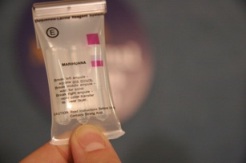
field test generating false positive from mere air
""That's just outrageous," exclaimed Eidinger.
That research came as part of new report, False Positives Equal False Justice, by forensics expert John Kelly in collaboration with former FBI chief scientist and narcotics officer Dr. Frederick Whitehurst. In the report, the pair uncovered "a drug testing regime of fraudulent forensics used by police, prosecutors, and judges which abrogates every American's constitutional rights," as Kelly wrote in the executive summary.
"Law enforcement officials, forensic drug analysts, and prosecutors knowingly employ the flawed Duquenois-Levine and KN Reagent tests as well as mere conclusory police reports to wrongfully prosecute and convict millions of individuals for anti-marijuana law violations," Kelly wrote. "These wrongful prosecutions and convictions violate Supreme Court rulings which prohibit the use of inaccurate, nonspecific tests and/or conclusory reports because they do not prove the presence of marijuana in a seized substance. In other words, millions of people have been, and continue to be, prosecuted and convicted of marijuana charges without proof that they possessed marijuana."
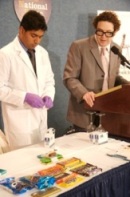
Dr. Bagasra testing the field test on chocolate
Both Kelly and MPP executive director Rob Kampia used the report's findings to call for a moratorium on the use of field drug testing kits. "It is imperative that law enforcement agencies take notice and voluntarily end the use of these flawed drug tests. The essential need of protecting the innocent must outweigh the convenience of a field drug test that only gives accurate information some of the time," wrote Kelly.
"In terms of policy recommendations, it's real simple, no one should be using these faulty field tests, they should be thrown out and the company that's making them should probably be put out of business," Kampia told the press conference. "Natural soap, chocolate and newspaper, among other household items, all will test positive for marijuana and other drugs such as GHB, yet these kits continue to be used in both arrests and prosecutions nationwide. In our society we have the principle that you are supposed to be innocent until proven guilty. These tests turn that on its head."
ODV, a subsidiary of Forensic Source, manufactures the NIK Narco Pouch 908 and 909 tested by the researchers. The company did not respond to requests for comment by day's end on Thursday. The tests' packaging warns that they can produce false positives, but does not mention that most of their positives are false.
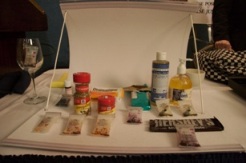
common items that generate false positives (Katie Schuler, bellvisuals.com)
False positive field drug tests can ruin your day. Ask Don Bolles, drummer for the punk band The Germs. He was arrested and jailed for three days in April 2007 because a field test said the Dr. Bronner's Magic Soap he had with him tested positive for GHB. That field test was done with the NarcoPouch 928, another in the ODV line. Later testing revealed the 928 would generate false positives with a wide variety of natural soaps, as well as soy milk.
Bryn Mawr honor student Janet Lee was another victim of inaccurate field drug test kits. As she prepared to fly home for Christmas break in 2003, she was arrested at the Philadelphia airport after three condoms filled with flour (she said she squeezed them for stress relief) came up as cocaine on a cobalt thiocyanate (C-T) field test. She spent three weeks in jail facing charges that could net her 20 years in prison before an attorney demanded the drug be retested. Lee collected $180,000 from the city two years later to settle a lawsuit, but still suffered the Kafkaesque nightmare of being jailed.
Lee was lucky. A jail guard recognized her as a volunteer and beat the bushes for a good attorney. It is unknown how many others like her there are who, lacking such resources, either were found guilty or plea bargained to crimes of which they were innocent because of deceptive field drug tests.
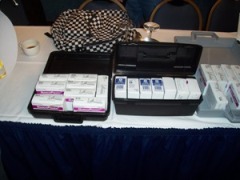
the fraudulent field test packets
Another widely publicized incident of bad field drug tests occurred in August, when Ron Obadia and Nadine Artemis were arrested, handcuffed to a chair, and interrogated for hours at the Toronto Airport after their raw chocolate tested positive for hashish with the Duquenois-Levine color chemical test. They were placed in separate rooms and were told that they faced "life in prison" unless they confessed. Each of them was also told that the other already had confessed.
Later lab testing proved it was indeed chocolate, not hash, and the pair were sent on their way. They also accumulated a $20,000 legal bill. To add insult to injury, when the couple tried again to fly to the US three weeks later with their raw chocolate, it again tested positive on the field test kit. This time, Obadia was arrested and charged with hash possession.
back to top
It's jail and prison guards gone wild this week, and a veteran California cop whose pill problem got the best of him. Let's get to it:
In Bangor, Maine, a former Penobscot County jail guard was sentenced Tuesday to six months in jail for smuggling marijuana and prescription drugs into the jail for prisoners. Lori Call pleaded guilty to two counts of trafficking in prison contraband. She also faces two years probation, random drug tests, and substance abuse counseling.
In New York City, a guard at the Sing Sing state prison was indicted Monday for accepting cash and cocaine from an undercover agent. Ashley Harris, 47, was arrested February 19 at a Bronx gas station after taking $500 and eight ounces of cocaine from the agent, who was posing as a drug dealer. Harris was indicted on six counts of criminal possession of a controlled substance, which prosecutors said was destined for the prison. His arrest was the culmination of a three-month sting by state narcs and the Department of Correctional Services.
In Kingston, New York, an Ulster Country Jail guard was arrested last Friday on charges he trafficked drugs at the jail. Guard Peter Portalatin, 23, went down after investigators determined he had smuggled heroin, Oxycontin, marijuana, and tobacco into the jail and set him up in a sting. He now faces charges of bribe receiving in the second degree, attempted criminal possession of a controlled substance in the third degree, receiving reward for official misconduct in the second degree, attempted promoting prison contraband in the first degree and tampering with physical evidence, all felonies. He was also charged with official misconduct and resisting arrest, both misdemeanors. He returned to the county jail as a prisoner until he makes his $10,000 cash bail. Oh, and he's now a former jail guard. He was fired the same day he was arrested.
In Texarkana, Arkansas, a former Miller County jail guard was sentenced February 26 to a whopping 28 years in prison for smuggling contraband hidden in food items to inmates. Jordan Michael Waller, 26, carried tacos, pizzas, and chili to work with him and used the food to hide cell phones, chargers, methamphetamine, marijuana, syringes, tobacco, and rolling papers. Family members testified that Waller suffered from paranoid schizophrenia, but that it was manageable with medication.
In Alameda, California, an Alameda police officer was arrested February 26 for visiting the residence of a terminally ill person and telling the family police provided medication disposal services, but keeping the pills for his own use. It did not appear to be an isolated incident, said police commanders. Sgt. Ronald Jones, a 26-year-year veteran of the department, was charged with two felony counts of using fraud, deceit or misrepresentation to obtain a controlled substance. He is on administrative leave.
back to top
As if we needed further confirmation that the war on drugs is racially biased in outcome, the human rights group Human Rights Watch released a report Monday showing that blacks have been arrested nationwide for drug offenses at significantly higher rates than whites for at least the past three decades. Whites and blacks engage in drug offenses at similar rates, but blacks were 2.8 to 5.5 times more likely to be arrested than whites in every year between 1980 and 2007.
The report, Decades of Disparity: Drug Arrests and Race in the United States, was based on the FBI's annual Uniform Crime Reports. In addition to national arrest figures, the report provides state by state comparisons of arrest numbers and rates.
More than 25.4 million people have been arrested on drug charges since 1980, the analysis found. About one-third of them were black, although African-Americans make up only about 13% of the population and 13% of drug users.
"Jim Crow may be dead, but the drug war has never been color-blind," said Jamie Fellner, senior counsel with Human Rights Watch's US Program and author of the report. "Although whites and blacks use and sell drugs, the heavy hand of the law is more likely to fall on black shoulders."
And modern day Jim Crow is popping up in some unexpected places. States where blacks are arrested at much greater rates than whites for drug offenses include Oregon, where blacks are 6.0 times as likely to be arrested as whites, West Virginia (6.9 times), Wisconsin (7.1 times), Pennsylvania and Nebraska (7.2 times), North Dakota (8.2 times), Vermont (8.6 times), Kentucky (9.9 times), and Minnesota, where blacks are 11.3 times as likely to get arrested for drugs as whites.
The report also says that arrests for drug possession have greatly exceeded arrests for drug sales every year since 1980. Indeed, the proportion of drug arrests for possession has been increasing, amounting to 80% or more annually since 1999. And marijuana possession arrests are a major driver of the overall figure. Between 2000 and 2007, simple pot possession arrests alone accounted for between 37.7% and 42.1% of all drug arrests.
"Hauling hundreds of thousands of people down to the station house each year because they have some weed or a rock of crack cocaine in their pocket has had little impact on drug use," said Fellner. "But the stigma of a drug arrest, especially if followed by a conviction, limits employment, education and housing opportunities. A more effective, less destructive drug policy would prioritize treatment, education, and positive social investments in poor communities over arrest and incarceration."
Human Rights Watch strongly recommended reducing the disparity in drug arrests -- but not by arresting more white people. Instead, it suggested it was time for a "fresh and evidence-based rethinking of the drug war paradigm." It called on all levels of government to:
- Restructure funding and resource allocation priorities to place more emphasis on substance abuse treatment and prevention outreach, and less on drug law enforcement;
- Review and revise drug sentencing laws to increase the use of community-based sanctions for drug offenses and to eliminate mandatory minimum sentences for them;
- Conduct comprehensive analyses of racial disparities in all phases of drug law enforcement to devise ways to ensure the enforcement of drug laws does not disproportionately burden black communities;
- Assess the extent to which considerations of race may influence police decision-making, including decisions regarding the neighborhoods in which police are deployed for drug law enforcement purposes and whom to arrest, particularly for low level offenses such as simple drug possession; and
- Monitor patterns in pedestrian and vehicle stops and other police activities to determine if unwarranted racial disparities exist that suggest racial profiling or other race-based decision-making and to take appropriate action to eliminate racially disparate treatment.
back to top
American states spent about $52 billion on corrections last year, the vast majority of it on prisons, and that's not smart, the Pew Center on the States said in a report released Monday. As a cost saving measure in a time of fiscal crisis at the statehouses, states should instead emphasize spending on community corrections.
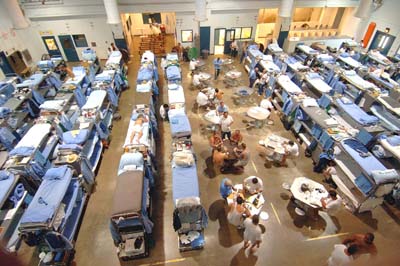
overcrowding at Mule Creek State Prison (cdcr.ca.gov)
The study,
1 in 31: The Long Reach of American Corrections, reported that one in every 31 Americans is in jail or prison or on probation or parole. That's more than 7 million people under state supervision, and that's more than double the rate 25 years ago. The report adds that the real figure may be closer to 8 million because the numbers don't include people under state supervision in pre-trial diversion programs, such as drug courts.
The rates of correctional control vary by race and geography. One in eleven black adults (9.2%) are enjoying the tender mercies of the state, compared to one in 27 Hispanics (3.7%) and one in 45 whites (2.2%). With one of every 13 adults behind bars or on probation or parole, Georgia has the highest percentage of its population under surveillance, followed by Idaho, Texas, Massachusetts, Ohio, and the District of Columbia.
"Violent and career criminals need to be locked up, and for a long time. But our research shows that prisons are housing too many people who can be managed safely and held accountable in the community at far lower cost," said Adam Gelb, director of the Center's Public Safety Performance Project, which produced the report.
But while prisons account for about 90% of the overall correction budget in the states, two-thirds of offenders are on probation or parole, not behind bars. Pressures to cut community corrections spending in the current crisis are penny wise but pound foolish, said the report.
"New community supervision strategies and technologies need to be strengthened and expanded, not scaled back," Gelb argued. "Cutting them may appear to save a few dollars, but it doesn't. It will fuel the cycle of more crime, more victims, more arrests, more prosecutions, and still more imprisonment."
The study recommended that states:
- Sort offenders by risk to public safety to determine appropriate levels of supervision;
- Base intervention programs on sound research about what works to reduce recidivism;
- Harness advances in supervision technology such as electronic monitoring and rapid-result alcohol and drug tests;
- Impose swift and certain sanctions for offenders who break the rules of their release but who do not commit new crimes; and
- Create incentives for offenders and supervision agencies to succeed, and monitor their performance.
The report did not address the role of drug prohibition in swelling the nation's prison population, nor did it question whether drug offenders should be arrested in the first place, let alone placed under state surveillance or imprisoned.
back to top
South Dakota has become the latest state to ban salvia divinorum, the hallucinogenic plant used for centuries by Mexican shamans whose recreational use has become noticeable in the US in recent years. Oddly enough, as the bill was amended in back and forth between the state House and Senate, legislators forgot to specifically make it a crime to distribute the herb.

Google ads for salvia on web page reporting salvia arrest
The bill does not go into effect until it is signed by Gov. Michael Rounds (R), who has indicated he will sign it. Once he does, the salvia ban goes into effect immediately because the bill declared an "emergency" regarding use of the fast-acting, short-duration psychedelic.
The bill creates two salvia possession offenses -- a misdemeanor for possession of less than two ounces of the plant or its active substance, Salvinorin A, and a felony for possession of more than two ounces. A misdemeanor charge can earn you up to a year in jail, while the Class 6 felony would be worth up to two years in the state penitentiary.
Rep. Lance Russell (R-Hot Springs) urged the House to reject the Senate version of the bill because it did not specifically outlaw distribution of salvia. But other lawmakers, eager to move ahead, said banning possession was a good enough start.
As the Chronicle noted last week, South Dakota is only the latest state to fall prey to salvia mania. Nebraska banned it a week ago, and similar measures are before legislatures in Alabama, Iowa, Maryland, Michigan, Minnesota, New Jersey, North Carolina, Ohio, Pennsylvania, South Carolina, and Texas.
Thirteen states -- Delaware, Florida, Illinois, Kansas, Mississippi, Missouri, Nebraska, North Dakota, Oklahoma, and Virginia -- have classified salvia as Schedule I under state drug laws. Make that 14 now that South Dakota has joined the list. Three more -- Louisiana, Maine, and Tennessee -- restrict the sale of the plant. Maine and California ban it only for minors.
back to top
Two leading civil liberties groups, the Electronic Frontier Foundation (EFF) and the American Civil Liberties Union, have intervened in a pending case in federal appeals court in Washington, DC. The two groups have filed an amicus brief urging the court to reject as unconstitutional the surreptitious placement, without a search warrant, of Global Positioning Service (GPS) devices by law enforcement on vehicles belonging to suspected criminals. Doing so without a warrant based on probable cause violates the Fourth Amendment's guarantees against unreasonable searches and seizures, the groups argued.
The brief was filed in US v. Jones, in which Lawrence Maynard and Antoine Jones were investigated by police for supposed cocaine trafficking. During the investigation, police placed a GPS device in Jones' vehicle, as well as surveilling the pair and targeting them with informants. They were ultimately arrested, and authorities seized 200 pounds of cocaine, a pound of crack cocaine, and $850,000 cash. Jones appealed, arguing that placement of a GPS device on his vehicle without a warrant violated his Fourth Amendment rights.
"The Supreme Court has recognized that a Fourth Amendment search may occur through the use of advanced technology to reveal detailed and personal information about individuals," the joint brief said. "These characteristics apply to GPS tracking, and a warrant should therefore be required for its unconsented use. Such a ruling also comports with the public's rejection of 'Big Brother' police surveillance, and with the empirical evidence that Americans have a strong expectation of privacy that their every movement by automobile or foot will not remotely be tracked or recorded by private parties or law enforcement."
The EFF and ACLU noted that the federal courts have previously placed limits on the use of new technologies to obtain information without a warrant. The US Supreme Court, for example, barred the use of thermal imaging of a person's home without a warrant.
The groups also argued that warrantless GPS tracking could undermine First Amendment rights to associate privately with others by allowing the government to track their whereabouts without their knowledge. "GPS tracking can reveal whether a person visits a Planned Parenthood clinic, patronizes a gay bar, or attends a meeting of an unpopular political organization," the brief states.
The groups also warned that GPS devices are growing more sophisticated and more versatile. Some GPS devices now work indoors, while others take the form of darts that can be fired at fleeing vehicles. "In sum, warrantless, remote GPS tracking trespasses on individuals' reasonable expectation not to be tracked electronically, twenty-four hours a day, for extensive periods of time," the brief concluded.
back to top
A bill that would legalize the medicinal use of marijuana in Minnesota has cleared a second committee in the state Senate, with the Judiciary Committee approving it on a narrow 4-3 vote. A hearing on the companion House bill before the House Civil Justice Committee is expected shortly.
The bill, SF 97, would allow qualified patients or their caregivers to possess up to 2 1/2 ounces of usable marijuana and 12 plants. People suffering from cancer, glaucoma, AIDS, Hep C, or Tourette's Syndrome or a chronic or debilitating disease or its treatment that produces wasting syndrome, intractable pain, severe nausea, seizures, or spasms whose doctors approve of their use would qualify.
A previous version of the bill passed the Senate and every House committee vote during the 2007-2008 session, but died without a House floor vote. It faced the strong opposition of law enforcement and a veto threat from Republican Gov. Tim Pawlenty. Pawlenty's position has not changed, but bill supporters are hoping it will.
"I am increasingly confident that this will be the year that Minnesota joins the 13 other states that have acted to protect medical marijuana patients from arrest," said bill sponsor Sen. Steve Murphy (DFL-Red Wing). "This is an issue where science, compassion and simple common sense come together."
Before voting, the Senate committee heard testimony from opponents and proponents of the bill. "Two puffs, two minutes, and the violent sickness was totally gone," said Kathy Rippentrop, who described her mother's use of marijuana to alleviate the symptoms of cancer chemotherapy. "An hour later, Mom was able to have a good meal. The stomach problems from the chemo were totally gone. It also helped her regain a quality of life that allowed her to continue to fight."
And while some worried that allowing for the use of medical marijuana would make law enforcement's job more difficult, Sen. Yvonne Prettner Solon (DFL-Duluth), whose husband died of colon cancer, was not one of them. "We're not talking about getting people hooked on drugs and then going out in the street and, you know, destroying their lives and passing it on to other people," said Prettner Solon. "We're talking about end of life issues -- a last resort for people's suffering."
back to top
For the first time, a medical marijuana bill has won an Illinois House committee vote. The House Human Services Committee voted 4-3 Wednesday to send forward HB 2514, the Compassionate Use of Medical Cannabis Pilot Program Act.
Under the bill, persons diagnosed by a physician as suffering a debilitating medical condition and their caretakers would be issued an ID card and placed on a registry run by the Department of Public Health. Each patient could possess up to two ounces of usable marijuana and seven plants. If enacted, the Illinois medical marijuana law would expire after three years and have to be reenacted.
A companion bill, SB 1381, is pending in the state Senate. It is sponsored by former state's attorney Sen. Bill Haine (D-Alton) and is scheduled for a hearing next Tuesday.
Wednesday's House committee vote came after public testimony from proponents and opponents of the bill. Medical marijuana patient Lucie MacFarlane, 46, of Joliet, told the panel she uses the herb to relieve the constant pain she suffers from neurofibromatosis and a surgery that left her spine fused.
"Doctors need every safe, effective medicine available to them when treating patients with serious conditions such as cancer, HIV/AIDS and multiple sclerosis," said Dr. Jay Riseman, a Springfield physician who testified before the committee. "I've seen medical marijuana work for patients when nothing else did, and I should be able to recommend it to my patients without leaving them vulnerable to arrest and even jail."
House bill sponsor Rep. Lou Lang (D-Skokie) was perhaps the bill's most ardent advocate. "People cannot get relief in any other place, except totally sedating and debilitating medication that makes them unable to cope with life," he said, pointing to MacFarlane and other patients. "Strong evidence shows that this is very significant help to them in their life, and I don't understand why anybody would be against this," Lang said.
But Lang understood all too well the opposition and blamed posturing politicians looking for any excuse to kill it. Addressing concerns raised by the California experience -- a much more wide open system than that envisioned in his bill -- Lang said the legislation is tightly drafted. "This is a very controlled bill. It doesn't allow anyone to have more than seven plants," Lang said. "Second, we have to be able to trust the medical community." He said there is little outcry when doctors prescribe massive amounts of morphine, Vicodin or codeine to alleviate pain. "It's only when you start talking about cannabis that people start talking about that, because they're looking for an excuse to be against the bill," he said.
back to top
As of Wednesday, some 1,500 Mexican soldiers had been deployed to Ciudad Juárez, the epicenter of the prohibition-related violence wracking the country. An additional 5,000 troops should join them by the weekend.

Mexican military anti-drug patrol
Ciudad Juárez, across the Rio Grande River from El Paso, was the scene of more than 1,600 drug war killings last year, and another 400 have been killed in fighting among competing drug trafficking organizations and between the cartels and the Mexican military and law enforcement so far this year.
The security situation in Ciudad Juárez has grown so grave that the mayor and his family have relocated across the border to El Paso after being threatened with decapitation. The city's police chief resigned last week after traffickers threatened to kill a policeman every 48 hours until he did. At first, the police chief stood firm, but resigned after traffickers killed a policeman and a prison guard. At mid-week this week, a bloody riot broke out between rival drug gang factions in a prison on the south edge of the city, leaving some 20 dead.
"Ciudad Juárez worries us deeply," Mexican Attorney General Eduardo Medina Mora said in an interview with Reuters. "It is the reason why there is a response by the federal government to support the request of local authorities. Public safety is a shared responsibility among the federal, state governments and municipalities. In areas where drug traffickers have a lot of influence, sadly there is a risk that they will have an interest in influencing the formation of public power, particularly the local authority. This is something that concerns us."
Since Mexican President Felipe Calderón called out the armed forces to go after the country's wealthy, powerful, and violent cartels in December 2006, around 9,000 people have been killed in prohibition-related violence. Thousands have been arrested and tons of drugs seized, but both the illicit drug trade and the violence show no signs of letting up.
That is making US officials increasingly nervous. Congress last year passed a three-year $1.4 billion anti-drug assistance package for Mexico and Central America, and Admiral Mike Mullen, head of the US Joint Chiefs of Staff was headed for Mexico late this week to offer further assistance to Calderón.
"Clearly one of the things he expects to talk to his counterparts in Mexico and other officials about is the growing violence and growing threat with regard to narco-trafficking and the drug cartels," Captain John Kirby, spokesman for Mullen, told Agence France-Presse. "We would welcome the opportunity to increase and enhance our military-to-military cooperation," Kirby said. "There's clearly room to do more."
Mullen wasn't the only high US official to express concern about the situation in Mexico this week. "The cartels are retaliating," Defense Secretary Robert Gates told NBC on Sunday. "It clearly is a serious problem."
But Gates added that the crisis has caused Mexico to drop its traditional arm's-length approach to the US military. "I think we are beginning to be in a position to help the Mexicans more than we have in the past," Gates said. "Some of the old biases against cooperation between our militaries and so on, I think, are being satisfied."
back to top
The mayors of the Dutch border towns of Roosendaal and Bergen op Zoom confirmed Thursday that they will shut down all marijuana selling coffee shops in their towns by September 16. They said that by closing the coffee shops they hoped to end the public nuisances created by an influx of some 25,000 non-Dutch pot buyers a week.
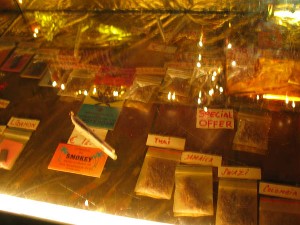
Smokey coffee shop in Amsterdam -- not closing down (courtesy amsterdam.info
Because of more repressive laws in neighboring countries such as France and Germany, Dutch coffee shops have been a favorite haunt of pot seekers in northwestern Europe. But the huge numbers of foreigners coming to the border towns has created traffic, public order, and other problems. Mayors of other border towns have responded with plans to move coffee houses from city centers to the outskirts.
The conservative Dutch national coalition government, while desiring to see an end to the coffee shops, has committed to taking no action until after new elections in 2010. That leaves the regulatory field to the mayors.
An attorney for coffee shop owners said there was little he could do until coffee shops are actually closed down. "But if you want to change drug policy, you first need to discuss it nationally and also check EU law if you want to discourage European tourists," said Harrie Nieland.
back to top
March 10, 1839: Lin Tse-hsu, the governor of the Chinese province of Hu-Huang, proclaims that the opium trade will no longer be tolerated in Canton, and he begins arresting known opium dealers in the local schools and naval barracks. Those found guilty of purchasing, possessing or selling opium are sentenced to public execution by strangulation. "Let no one think," Lin proclaimed, "that this is only a temporary effort on behalf of the Emperor. We will persist until the job is finished."
March 6, 1907: Gov. James Gillett signs the Poison Act Amendments, launching California's war on drugs.
March 11, 1966: Psychedelic guru Timothy Leary receives a 30-year prison sentence in Texas for trying to cross into the US from Mexico with a small amount of marijuana.
March 8, 1973: The US Coast Guard conducts its first Coast Guard-controlled seizure when the USCGC Dauntless boards a 38-foot sports fisherman boat, the Big L, and arrests its master and crew with more than a ton of marijuana on board.
March 9, 1982: The largest US domestic cocaine seizure ever to date raises US awareness of the Medellin cartel. The seizure of 3,906 pounds of cocaine, valued at over $100 million wholesale, from a Miami International Airport hanger tells US law enforcement that Colombian traffickers must be working together because no single trafficker could be behind a shipment that large.
March 10, 1984: By tracking the illegal sale of massive amounts of ether to Colombia, the DEA and Colombian police discover Tranquilandia, a laboratory operation deep in the Colombian jungle. In the subsequent bust, law enforcement officials destroy 14 laboratory complexes, which contain 13.8 metric tons of cocaine, 7 airplanes, and 11,800 drums of chemicals, conservatively estimated at $1.2 billion. The bust confirms the consolidation of the Medellin cartel's manufacturing operation.
March 12, 1998: Canada legalizes hemp production and sets a limit of 0.3% THC content that may be present in the plants and requires that all seeds be certified for THC content.
March 12, 1998: The mayors of San Francisco, Oakland, Santa Cruz and West Hollywood write letters to President Clinton asking him to keep the cannabis buyers clubs open. They tell the president: "If the centers are shut down, many of these individuals will be compelled to search back alleys and street corners for their medicine," and ask him to "implement a moratorium on enforcement of federal drug laws that interfere with the daily operation of the dispensaries."
March 9, 2001: William J. Allegro, 32, of Bradley Beach, New Jersey is sentenced to 50 years in prison for growing marijuana in his home. "The court imposed this sentence because the court felt obligated to do so under the law," says Judge Paul F. Chaiet, a former prosecutor. "Mandatory sentencing provisions can create difficult results. In the court's view, this is one of those times where the ultimate results are difficult to accept."
March 10, 2004: In a Washington Post article, "Obesity Passing Smoking as Top Avoidable Cause of Death," Health and Human Services Secretary Tommy G. Thompson, when asked about unhealthy foods, says, "I don't want to start banning things... Prohibition has never worked." [NOTE: In 2000, only 0.7% of all deaths were due to illicit drug use while poor diet and physical inactivity was responsible for 16.6% of all deaths.]
back to top
Along with our weekly in-depth Chronicle reporting, DRCNet also provides daily content in the way of blogging in the Stop the Drug War Speakeasy -- huge numbers of people have been reading it recently -- as well as Latest News links (upper right-hand corner of most web pages), event listings (lower right-hand corner) and other info. Check out DRCNet every day to stay on top of the drug reform game! Check out the Speakeasy main page at http://stopthedrugwar.org/speakeasy.

prohibition-era beer raid, Washington, DC (Library of Congress)
Since last issue:
Scott Morgan offers: "If Obama Supports Medical Marijuana, What About Hemp?," "Field Tests for Identifying Drugs Are Proven Wildly Inaccurate," "SWAT Raids on Innocent People are Bad," "How Come the Dutch Smoke Less Marijuana Than Americans?," "California DMV Agrees to Let Medical Marijuana Patients Drive," "Maybe a Quirky Folk Song Will Lead to Marijuana Legalization...," "Mexican President Surprised to Learn That the Drug War is Super Violent," "Man Uses Fake Money to Buy Fake Drugs," "Former Drug Warrior Now Lives With his Parents."
David Guard posts numerous press releases, action alerts and other organizational announcements in the In the Trenches blog.
Please join us in the Reader Blogs too.
Again, http://stopthedrugwar.org/speakeasy is the online place to stay in the loop for the fight to stop the war on drugs. Thanks for reading, and writing...
back to top
Want to help end the "war on drugs," while earning college credit too? Apply for a StoptheDrugWar.org (DRCNet) internship for this spring or summer semester and you could come join the team and help us fight the fight!
StoptheDrugWar has a strong record of providing substantive work experience to our interns -- you won't spend the summer doing filing or running errands, you will play an integral role in one or more of our exciting programs. Options for work you can do with us include coalition outreach as part of the campaign to rein in the use of SWAT teams, to expand our work to repeal the drug provision of the Higher Education Act to encompass other bad drug laws like the similar provisions in welfare and public housing law; blogosphere/web outreach; media research and outreach; web site work (research, writing, technical); possibly other areas. If you are chosen for an internship, we will strive to match your interests and abilities to whichever area is the best fit for you.
While our internships are unpaid, we will reimburse you for metro fare, and DRCNet is a fun and rewarding place to work. To apply, please send your resume to David Guard at [email protected], and feel free to contact us at (202) 293-8340. We hope to hear from you! Check out our web site at http://stopthedrugwar.org to learn more about our organization.
back to top
Do you read Drug War Chronicle? If so, we'd like to hear from you. DRCNet needs two things:
- We are in between newsletter grants, and that makes our need for donations more pressing. Drug War Chronicle is free to read but not to produce! Click here to make a donation by credit card or PayPal, or to print out a form to send in by mail.
- Please send quotes and reports on how you put our flow of information to work, for use in upcoming grant proposals and letters to funders or potential funders. Do you use DRCNet as a source for public speaking? For letters to the editor? Helping you talk to friends or associates about the issue? Research? For your own edification? Have you changed your mind about any aspects of drug policy since subscribing, or inspired you to get involved in the cause? Do you reprint or repost portions of our bulletins on other lists or in other newsletters? Do you have any criticisms or complaints, or suggestions? We want to hear those too. Please send your response -- one or two sentences would be fine; more is great, too -- email [email protected] or reply to a Chronicle email or use our online comment form. Please let us know if we may reprint your comments, and if so, if we may include your name or if you wish to remain anonymous. IMPORTANT: Even if you have given us this kind of feedback before, we could use your updated feedback now too -- we need to hear from you!
Again, please help us keep Drug War Chronicle alive at this important time! Click here to make a donation online, or send your check or money order to: DRCNet, P.O. Box 18402, Washington, DC 20036. Make your check payable to DRCNet Foundation to make a tax-deductible donation for Drug War Chronicle -- remember if you select one of our member premium gifts that will reduce the portion of your donation that is tax-deductible -- or make a non-deductible donation for our lobbying work -- online or check payable to Drug Reform Coordination Network, same address. We can also accept contributions of stock -- email [email protected] for the necessary info.
back to top










